Danger of E.U. and North Africa Bank Runs 2011
Stock-Markets / Credit Crisis 2011 Feb 03, 2011 - 03:42 AM GMTBy: Gordon_T_Long
 This is a warning to prepare for potential stealth bank runs cascading from North Africa and Ireland through to EU regional banking centers.
This is a warning to prepare for potential stealth bank runs cascading from North Africa and Ireland through to EU regional banking centers.
Stealth bank runs are the unrecognized and perilous serpent lurking presently below the European financial surface. They prey on slower moving archaic bond vigilantes and anyone else swimming in these dangerous uncharted waters.
Investors need to fully appreciate that a modern bank run looks and operates differently than what is depicted in the movies and what we most likely expect to occur!
For starters, it isn't the individual depositor lining up, it's now Corporate CFOs or Treasurers at their terminal en masse!
Secondly, it isn't driven by local depositors; it is now driven internationally by Corporate Finance committees!
Thirdly, there are no telltale line-ups at bank doors. It is stealth, which will happen in an unexpected electronic 'flash crash' panic blur!
Today, a triggering event will initiate global 'key strokes' that will move unprecedented amounts of money within hours.
The Council of Foreign Relations just released a surprising report entitled: Sovereign Credibility and Bank Runs.
"In the midst of the financial crisis of 2008, governments helped to prevent bank runs by guaranteeing bank debts. Yet as sovereign solvency itself becomes an issue, such guarantees quickly lose their value. If Ireland provides a rule of thumb, bank runs can be expected once sovereign credit default swap yields pass 3%. The figure below shows that when Irish government CDS yields first passed 3% in early 2009, foreign deposits fled the country. This happened again in late 2010. Now that Spanish CDS yields have broken the 3% threshold, there is reason to be concerned about the stability of Spanish bank deposits as well."
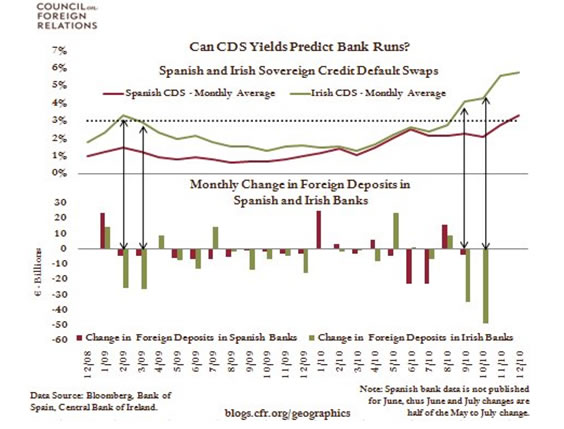
The Council's report conspicuously leaves out Portugal which the following European CDS spreads clearly identify as being above their 3% threshold line along with Spain and long time banking problem Greece.
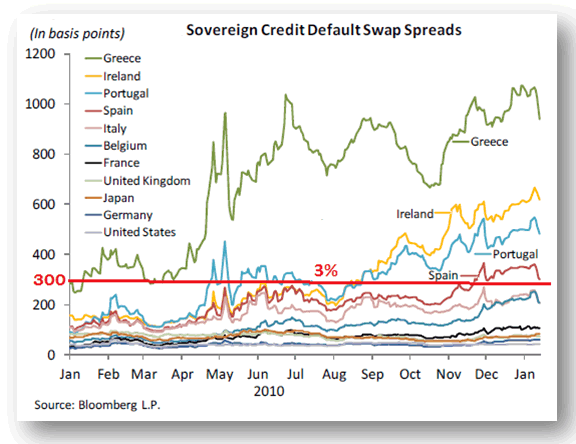
There is little doubt with all the coverage on the European PIIGS that there is financial fragility present in the EU and with all investors having money invested in European banks. Now we must add the North Africa / Middle East event shock.
Egyptian CDS spreads have now doubled to over 400 bps This is well above the 300 bps threshold level. Is it any wonder that Mubarak immediately shut down all Egyptian banks for fear of both domestic band international bank runs.
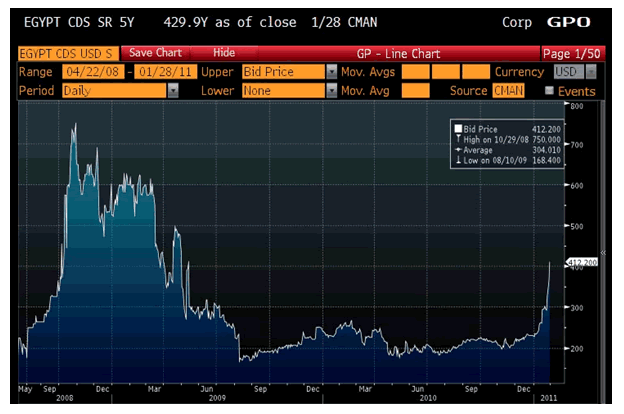
Egypt Banks Risk Run as Week of Protests Hits Economy Bloomberg 01-31-11
ITALY - The Invisible Elephant
The Italy / Spain = > North Africa link is historically significant!
Italy has a cool 2 Trillion EUR in debt and has much worse debt statistics than Spain (we will discuss this below). Italy's debt-to-GDP ratio is 118% (2009). Greece got in trouble at 116%. Italy's deficit is smaller and has a high savings ratio. However, nobody focuses on that as Spain is in the limelight with a debt-to-GDP ratio under 60%. Should austerity measures result in a nominal GDP contraction in Italy, its debt stats will worsen very rapidly.
Italy is the elephant in the room followed closely by Spain.
Consider carefully the following chart and remember that significant Italian & Spanish trade & loans flow to North Africa.
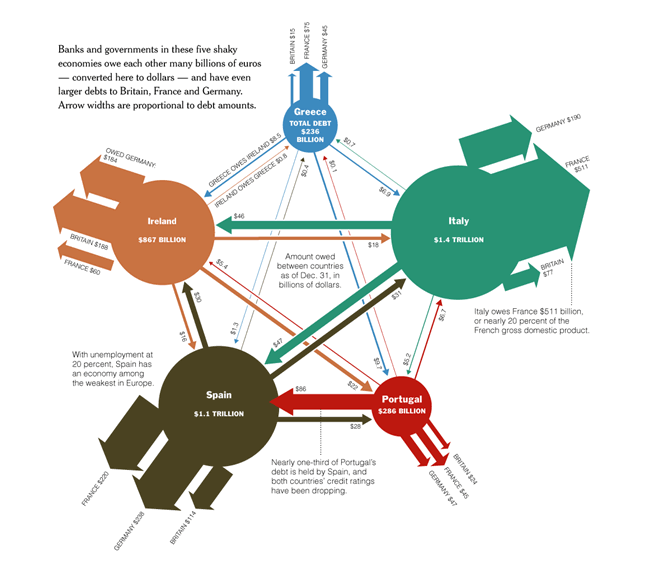
TRIGGER POINTS
Nothing scares a Financial Officer more than:
1- Frightening Financial 'Headline News',
2- Securities Counterfeiting,
3-Government Financial Grabs & Nationalization or
4- False Accounting.
Let's examine each of these from an international finance committee's perspective so you can appreciate the 'buzz' around the table as they overlay the unfolding North African events onto their major concerns with European Banking.
1- Frightening Financial Headline News
Is a bank run about to bring Europe to its knees? - Fortune
Some market watchers say yes, pointing ominously to the torrents of money pouring out of Ireland. Irish bank deposits declined in November for the fourth straight month, the central bank said last week. Overseas deposits fled the country at their fastest pace in more than a year.
The deposit flight compounds the stress on a financial system whose massive property-lending losses already have driven the government to accept an unpopular bailout from the European Union and the International Monetary Fund. Worse yet, it shows that the solutions policymakers slapped together in the fall of 2008 helped in some cases to create even bigger problems -- ones that are now coming due.
Unconditionally guaranteeing bank deposits is just such a policy, in a country where loan losses made the banks insolvent, job loss left many taxpayers penniless and deposits now at least double annual economic output. And this time, given the unpopularity of bailouts and dysfunctional European politics, there is ample reason to fear the banking mess won't so easily be swept aside.
"Facing facts like these, each morning when I wake up I have to wonder, 'Why is today not a good day for a wholesale run on the Irish banking system?' And if there is a wholesale run on the Irish banking system, then what stops the same scenario from cascading into Portugal, Greece, Italy, and most importantly, Spain?"
Scott Minerd, chief investment officer at Guggenheim Partners.
Bank runs "will seriously undermine the prosperity of this country for a generation. The first steps to stemming the run would include "a big external aid package and steps by the Irish government."
Pimco's Mohammed El-Erian said in November.
When you consider that similar trends could easily play out in the other euro countries, you have the recipe for a hangover-inducing New Year that is likely, in the view of Minerd, to see the euro plunge anew against the dollar. He expects the euro to test its decade long low against the dollar of 85 cents before all is said and done, compared with a recent $1.33.
"As sovereign credit downgrades continue to flow in and deposits in Europe's weakened banking system flow out, a broader crisis in Europe appears to be imminent in 2011," says Minerd.
This chart from SocGen makes very clear that in Europe, the perceived credit risk of various banks is tightly linked to the credit risks of the countries in which they preside. That magnifies the risk significantly, and truly creates a notion of systemic risk. In the US it's conceivable to have lots of defaults without a follow-on systemic crisis.
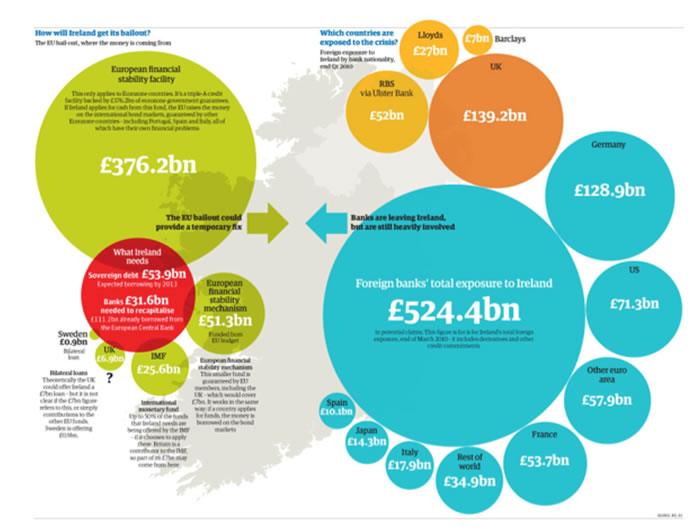
SPAIN - Pressure on Spanish Banks
Are credit markets predicting a bank run in Spain? (Pressure builds on Spain's banks Fortune)
The cost of insuring Spanish government debt climbed above 3% this month for the first time. Credit default swaps referencing 5-year Spanish government bonds traded at 340 basis points Wednesday, according to CMA data, meaning it costs $340,000 annually to protect $10 million of Spanish debt against default. But as the cost of the Irish bank bailout soared late last year, the Irish sovereign CDS spread surged past 3% again, and foreign deposits resumed flowing out.
It is that flow that makes some investors think 2011 will be the year of the European bank run, starting in Ireland – whose CDS spreads now exceed 6% -- and moving on to Portugal (5%) and then, perhaps, much bigger Spain.
Of course, it is early yet to say there will be a run on Spain's banks. While Spain and Ireland both had huge property bubbles, Spain's biggest banks, Santander (STD) and Banco Bilbao (BBVA), have substantial international businesses and thus appear to be in much better shape than their Irish counterparts, such as the fraud-ridden Anglo Irish or the simply deflated Allied Irish (AIB).
The bad news is that there have been signs of a deposit pricing war that could add to the stress on the smaller regional banks, which are seen as the weak link in the system. There are few indications the government is moving aggressively to clean up the bad loans everyone knows are out there.
Even if all goes well, the Spanish banking system is going to need time to earn its way out of years of property-lending misery. But if deposits start fleeing the country in earnest, the government will need to step in with costly actions, such as mergers and recapitalizations and takeovers. And as the Irish experience shows, a rising tab for taxpayer support of the banks isn't a recipe for making anyone happy -- let alone for keeping money from heading for the exits.
2- Securities Counterfeiting
The international corporate finance committees and every CFO / Treasurer are reading that for the first time in the global fiat currency system we have a European government printing money 'un-backed' in any way including the issue of government debt instruments (even if those instruments are a worthless shame). This is nothing short of outright financial counterfeiting.
Ireland Prints 25% of its GDP in German Euro’s Barnes
The Irish Central Bank has crossed the Rubicon in European Union currency terms. They have printed up about 25% of their GDP in electronic credits, and stuffed those credits into their banks. These deposits, if you will, do not have new debt issued behind them.
This is a form of hyperinflation if you will, at least in context that a Central Bank, with no actual printing press, or a functioning bond market, has now electronically printed up new currency units for their banks without issuing debt behind these actions.
While this has happened before in history, it has not happened in the Euro currency project officially before today. This act is going to move the monetary policy of the union, to the individual capitals. The capacity to print electronic credits, with out the creation of cash currency or debt, is a new wrinkle in the economic landscape.
The implications and ramifications will take a while to appear, but “Mark” my words, Germany both as a people, and as a political organization will notice this event. The German people now find themselves captured in a currency where neighbors who are in political and financial stress, have the capacity to print up German Euros on demand. This is Germany’s worse nightmare as both a nation and a people. I dare say, you could not design a more frightening prospect for the “United German States”, than to find their currency diluted on demand by reckless neighbors.
In the coming weeks, and I say that because thing rarely happen quickly in life, Europe is going to have a Sovereign crisis of epic size. They will have to decide what happens next, and do so rather quickly.
EU politicians have known about Ireland’s decision to print currency for weeks now. They have had time to consider their response to Ireland’s dilution of the Euro. I do not expect an initial reaction in the currency markets, as this kind of event takes time to be absorbed by all stakeholders in the Euro.
The Celtic Tiger has made their move and resorted to naked currency printing, to support its banks. The next move belongs to Europe and it’s going to be interesting to see how this plays out in the public arena’s. We know who is first, what CB will be second?
Irish lenders besiege central bank for emergency loans Pritchard
The latest data shows that Anglo Irish Bank and other lenders had borrowed €51bn (£43bn) from the Irish central bank by the end of December, under an obscure progamme listed in the balance sheet as "other assets". This comes on top of €132bn in loans from the ECB itself, the figure normally tracked by analysts and itself 24pc of all ECB lending.
"This is a horror story: it shows the cataclysmic condition of the Irish banking system," said Tim Congdon from International Monetary Research. "The banks have borrowed €183bn in total, or 110pc of Irish GDP. They have burned through all their capital and a lot of their deposits as well. This is going to end up on the national debt".
The actions of the Irish central bank are authorized by Frankfurt, but fall into a grey area of monetary policy since they appear to involve creation of money outside the normal control of the ECB's governing council. The use of Ireland's emergency liquidity assistance program (ELA) raises further questions since the quality of collateral is unacceptable for normal ECB operations. The volume of borrowing has begun to level off after a surge in November.
3- Government Financial Grabs and Nationalization
Hungary, Poland, France, Bulgaria and Ireland and are taking over citizens' pension money to make up government budget shortfalls.
The Adam Smith Institute Blog European nations begin seizing private pensions Hungary, Poland, and three other nations take over citizens' pension money to make up government budget shortfalls. Old women eat lunch in a retirement home in Budapest Dec. 13, 2010. Hungarian lawmakers rolled back a 1997 pension reform, allowing the government to effectively seize up to $14 billion in private pension assets to reduce the budget gap while avoiding painful austerity measures. People’s retirement savings are a convenient source of revenue for governments that don’t want to reduce spending or make privatizations. As most pension schemes in Europe are organised by the state, European ministers of finance have a facilitated access to the savings accumulated there, and it is only logical that they try to get a hold of this money for their own ends. In recent weeks I have noted five such attempts: Three situations concern private personal savings; two others refer to national funds.
The most striking example is Hungary, where last month the government made the citizens an offer they could not refuse. They could either remit their individual retirement savings to the state, or lose the right to the basic state pension (but still have an obligation to pay contributions for it). In this extortionate way, the government wants to gain control over $14bn of individual retirement savings.
The Bulgarian government has come up with a similar idea. $300m of private early retirement savings was supposed to be transferred to the state pension scheme. The government gave way after trade unions protested and finally only about 20% of the original plans were implemented.
A slightly less drastic situation is developing in Poland. The government wants to transfer of 1/3 of future contributions from individual retirement accounts to the state-run social security system. Since this system does not back its liabilities with stocks or even bonds, the money taken away from the savers will go directly to the state treasury and savers will lose about $2.3bn a year. The Polish government is more generous than the Hungarian one, but only because it wants to seize just 1/3 of the future savings and also allows the citizens to keep the money accumulated so far.
The fourth example is Ireland. In 2001, the National Pension Reserve Fund was brought into existence for the purpose of supporting pensions of the Irish people in the years 2025-2050. The scheme was also supposed to provide for the pensions of some public sector employees (mainly university staff). However, in March 2009, the Irish government earmarked €4bn from this fund for rescuing banks. In November 2010, the remaining savings of €2.5bn was seized to support the bailout of the rest of the country.
The final example is France. In November, the French parliament decided to earmark €33bn from the national reserve pension fund FRR to reduce the short-term pension scheme deficit. In this way, the retirement savings intended for the years 2020-2040 will be used earlier, that is in the years 2011-2024, and the government will spend the saved up resources on other purposes.
It looks like although the governments are able to enforce general participation in pension schemes, they do not seem to be the best guardians of the money accumulated there.
Partial Nationalization of Cajas Savings Banks (Spain plans partial nationalization of savings banks)
Estimates of the cost to recapitalize the banks range from 17 billion to 120 billion euros with consensus falling in the 25 billion to 50 billion area, though Economy Minister Elena Salgado says it will be much lower.
Spain plans a partial state takeover of its weakest savings banks as it seeks to reassure investors a rescue will not weigh on its deficit. The government would force debt-laden regional savings banks to become conventional banks and seek stock market listings to persuade skittish investors that they are good investments.
A bank recapitalization worth 50 billion euros would amount to about 5 percent of Spanish gross domestic product, which could endanger the government's goal of cutting the budget deficit to 6 percent of GDP this year.
4- False Accounting
What is obvious to any CFO / Treasurer following the banking situation in Europe is that the European Bank Stress tests were at best a sham and possibly even bordering on outright market manipulation by the powers to be. They are not convinced.
The EU 'Extend & Pretend' program of hiding massive toxic debts, the avoidance of 'market-to market' real estate accounting valuations to reflect (even approximate) acceptable LTV ratios, extensive off balance sheet Structured Investment Vehicle (SIV) bank debt obligations still in place and extreme bank leverage ratios relative to the rest of the world, leaves most financial professionals nervous. Very nervous.
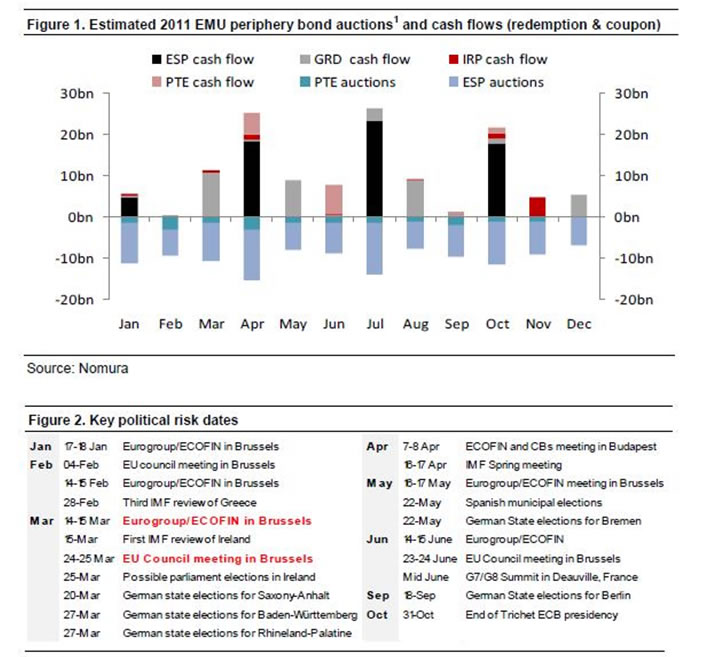
EUROPE'S 2011 FINANCIAL PRESSURE POINTS Financial Times
DUE FOR A SOVEREIGN DEBT CRISIS
We Really Are Due For A Sovereign Debt Crisis Right About Now Clusterstock
Sovereign debt crisis are actually pretty common so there's nothing particularly abnormal about the current situation in Europe, according to Rabobank.
Their research shows that sovereign defaults go all the way back to the fourth century B.C. It's only been recently that everyone has forgotten and dismissed the threat of sovereign default.
From Rabobank:
In fact, if anyone would speak about it a few years ago, their economic understanding, and even possibly their sanity, would be questioned by all. Sovereign debt crisis was a thing of the past, or so the argument went. And if it did occur, it would most probably be in a ‘third world’ country. The simple reason was that industrialized countries had ‘graduated’ from periodic bouts of government insolvency given that they did not opt for a default since the 1960s.
The bank's exhibit, a chart from the economists Reinhart and Rogoff, showing sovereign default is in no way abnormal. Notable, the absence of "advanced economy" default since the 1960s. The eurozone crisis could be about to end that.
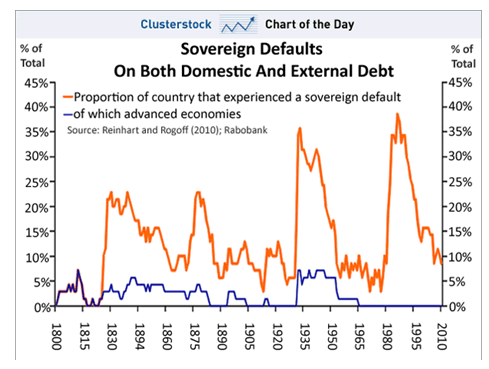
“You will not know about, nor see these stealth bank runs until it is far too late to react”
The movement of money is hidden electronically and reported long after the fact.

Sign Up for the next FREE release in any of our research article themes at TIPPING POINTS
SIGNUP FOR THIS FREE MONTHLY ANALYSIS
E-mail: lcmgroupe@comcast.net
Type in the Subject Line: TA Newsletter
Gordon T Long gtlong@comcast.net Web: Tipping Points Mr. Long is a former executive with IBM & Motorola, a principle in a high tech start-up and founder of a private Venture Capital fund. He is presently involved in Private Equity Placements Internationally in addition to proprietary trading that involves the development & application of Chaos Theory and Mandelbrot Generator algorithms.
Gordon T Long is not a registered advisor and does not give investment advice. His comments are an expression of opinion only and should not be construed in any manner whatsoever as recommendations to buy or sell a stock, option, future, bond, commodity or any other financial instrument at any time. While he believes his statements to be true, they always depend on the reliability of his own credible sources. Of course, he recommends that you consult with a qualified investment advisor, one licensed by appropriate regulatory agencies in your legal jurisdiction, before making any investment decisions, and barring that, we encourage you confirm the facts on your own before making important investment commitments.
© Copyright 2010 Gordon T Long. The information herein was obtained from sources which Mr. Long believes reliable, but he does not guarantee its accuracy. None of the information, advertisements, website links, or any opinions expressed constitutes a solicitation of the purchase or sale of any securities or commodities. Please note that Mr. Long may already have invested or may from time to time invest in securities that are recommended or otherwise covered on this website. Mr. Long does not intend to disclose the extent of any current holdings or future transactions with respect to any particular security. You should consider this possibility before investing in any security based upon statements and information contained in any report, post, comment or recommendation you receive from him.
© 2005-2022 http://www.MarketOracle.co.uk - The Market Oracle is a FREE Daily Financial Markets Analysis & Forecasting online publication.



